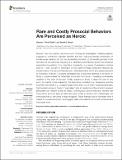| dc.contributor.author | Kraft-Todd, Gordon T. | |
| dc.contributor.author | Rand, David Gertler | |
| dc.date.accessioned | 2020-12-09T16:21:41Z | |
| dc.date.available | 2020-12-09T16:21:41Z | |
| dc.date.issued | 2019-02 | |
| dc.date.submitted | 2018-09 | |
| dc.identifier.issn | 1664-1078 | |
| dc.identifier.uri | https://hdl.handle.net/1721.1/128752 | |
| dc.description.abstract | Heroism has only recently become a topic of empirical investigation. Existing research suggests a connection between heroism and four well-documented dimensions of human social behavior: (1) the cost incurred by the actor; (2) the benefit provided to the recipient; (3) the perceived frequency (i.e., descriptive normativity); and (4) the perceived expectation to perform it (i.e., injunctive normativity). In a series of exploratory studies (total N = 408), we aim to shed light on how each of these constructs influence lay intuitions about the nature of heroism (i.e., what determines which acts people perceive to be heroic). In Study 1, subjects generated a list of acts they deemed to be heroic. In Study 2, subjects rated the heroicness of the acts from Study 1, revealing considerable variation in the level of heroism. Finally, subjects in Study 3 rated the cost to the actor, the benefit to the recipient(s), the descriptive normativity (i.e., frequency), and the injunctive normativity (i.e., obligatoriness) of ten acts, five of which received particularly high heroism scores in Study 2 ("exemplary" acts of heroism) and five of which received particularly low heroism scores in Study 2 ("ambiguous" acts of heroism). We find that more heroic acts are seen as rarer and more costly to actors-but, interestingly, not more beneficial to recipients or less obligatory. These findings help to illuminate what it means to be seen as a hero, and suggest clear future directions for both empirical and theoretical work. | en_US |
| dc.description.sponsorship | Defense Advanced Research Projects Agency (Grant D17AC00005) | en_US |
| dc.language.iso | en | |
| dc.publisher | Frontiers Media SA | en_US |
| dc.relation.isversionof | http://dx.doi.org/10.3389/fpsyg.2019.00234 | en_US |
| dc.rights | Creative Commons Attribution 4.0 International license | en_US |
| dc.rights.uri | https://creativecommons.org/licenses/by/4.0/ | en_US |
| dc.source | Frontiers | en_US |
| dc.title | Rare and Costly Prosocial Behaviors Are Perceived as Heroic | en_US |
| dc.type | Article | en_US |
| dc.identifier.citation | Kraft-Todd, Gordon T. and David G. Rand. "Rare and Costly Prosocial Behaviors Are Perceived as Heroic." Frontiers in Psychology 10 (February 2019): 234 © 2019 Kraft-Todd and Rand | en_US |
| dc.contributor.department | Massachusetts Institute of Technology. Department of Brain and Cognitive Sciences | en_US |
| dc.contributor.department | Massachusetts Institute of Technology. Department of Psychology | en_US |
| dc.relation.journal | Frontiers in Psychology | en_US |
| dc.eprint.version | Final published version | en_US |
| dc.type.uri | http://purl.org/eprint/type/JournalArticle | en_US |
| eprint.status | http://purl.org/eprint/status/PeerReviewed | en_US |
| dc.date.updated | 2020-12-09T13:43:06Z | |
| dspace.orderedauthors | Kraft-Todd, GT; Rand, DG | en_US |
| dspace.date.submission | 2020-12-09T13:43:09Z | |
| mit.journal.volume | 10 | en_US |
| mit.license | PUBLISHER_CC | |
| mit.metadata.status | Complete | |
